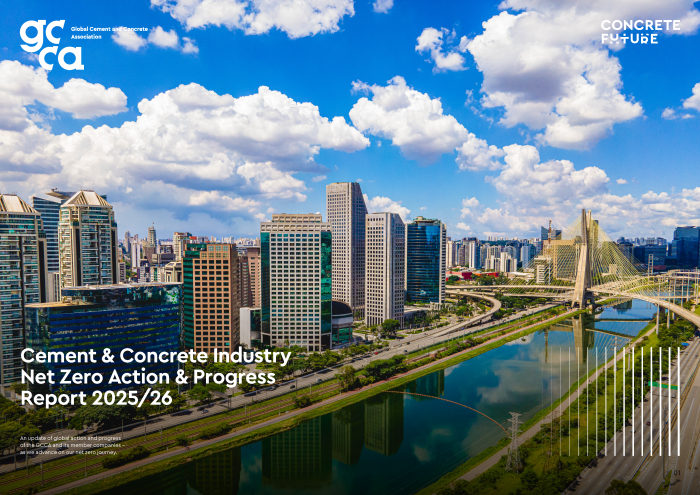Cement and concrete are the essential materials for delivering progress and building the resilient and sustainable communities our world needs.
Concrete (and its key binding ingredient of cement) is the backbone of modern society. It is the essential building material that provides everything from homes, schools, offices, transport networks and critical infrastructure – all of which are, and will continue to be, crucial to modern society. As our global population increases and urbanises, and in the face of a changing climate, concrete will be vital in providing society the foundations of what it needs to prevail and prosper.
Our material is responsible for approximately 7% of global CO2 emissions. That is why in 2021, the global cement and concrete sector, led by the GCCA, came together under the Cement Industry 2050 Net Zero Roadmap to commit to producing net zero concrete by 2050.
Tracking our progress

The Cement and Concrete Industry Net Zero Action and Progress Report is our annual report which tracks our sector’s decarbonisation progress across the levers we set out in our Net Zero roadmap. It also highlights examples of decarbonisation projects that are taking place across our sector, from every corner of the globe, from CCUS pilots and deployments to innovations in clinker production, renewable energy and calcined clay.
Despite the breadth of action and progress on our long-term project of deep decarbonisation, greater progress could be achieved today with the right policy support across the world to underpin the transition.
Only by industry and government working together can we achieve our shared net-zero goal. We need policymakers around the world to act on a range of topics such as: helping to stimulate demand for low carbon cement and concrete, supporting the use of non-reusable and non-recyclable societal waste being safely treated and used as alternative for fossil fuels in our kilns, backing the use of supplementary materials, supporting circularity in the built environment, and both recognising and supporting the important role that technologies such as carbon capture use and storage can play in industrial decarbonisation.
Reports from previous years



Policy Support We Require
We call on governments and policymakers to support us across five key policy areas
Supplementary Materials
Use of blended cements and Supplementary Cementitious Materials (SCMs) can be increased now through policies that ensure government procurement permits SCMs and latest material standards are available. In the short term policies need to promote and enable access to relevant materials and establish government funding programmes to develop material standards, including performance based standards.
Carbon Pricing
An appropriate carbon price, as well as long-term predictability of the carbon price, allows companies to make the investments needed to reduce their CO₂. Policymakers must ensure that use of carbon pricing does not lead to distortions of competition between domestic producers and importers. The transition towards carbon neutral economies is dependent on the acceptance of carbon constraints and costs by all actors along economic value chains.
CCUS
Policy across all geographies is not yet strong enough to drive the number and scale of projects needed for cement manufacturing to be on track to meet net zero by 2050. Policy needs to address public financing, recognition of carbon removal, transport and storage infrastructure, access to decarbonised electricity, carbon pricing and demand for low carbon product.
Waste Treatment in Kilns
The right policies enable the industry to replace the majority of fossil fuels with energy recovered from waste. In addition, recycling of mineral from waste is also achieved. And yet globally less than 10% of energy needed in cement kilns comes from waste. Policies need to recognise and implement the fact that waste treatment in kilns is more sustainable than landfill and incineration.
Low Carbon Procurement
The demand side can drive supply side decarbonisation through low carbon procurement. GCCA provides an EPD tool to calculate the carbon impact to compare with the definitions. Policymakers need to build on this foundational work with demand side pledges such as Clean Energy Ministerial’s Industrial Deep Decarbonisation Initiative.